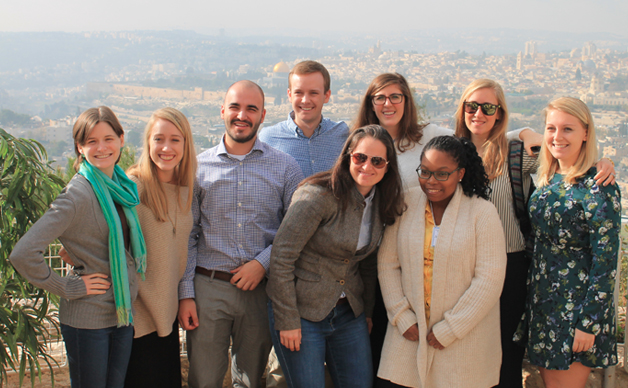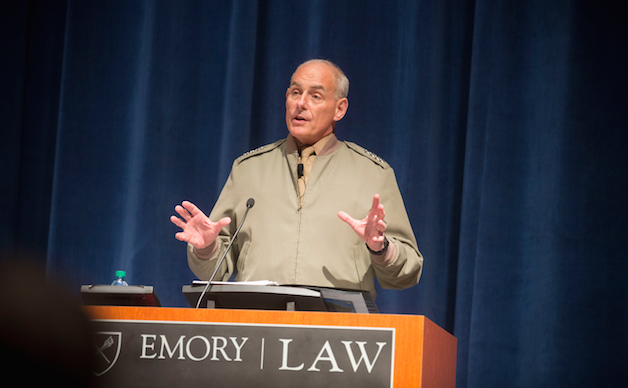
Laurie Blank: News Releases and In the News


Blank weighs in on use of pagers as explosives

Professor Laurie Blank to serve as special counsel to general counsel of DoD

Blank: Strict rules govern treatment of POWs

Blank: War reparations for Ukraine

Blank: Mounting evidence of war crimes in Ukraine

Blank: International laws that might hold Putin accountable

Blank: The difference between war crimes, genocide

Blank: Targeting civilians could violate international law

Blank: You can't label U.S. F-22s with Chinese flags

Blank: Russian invasion flagrant breach of international law

Blank: War in Ukraine a 'dangerous moment' for the world

Blank: New wargame can teach law of war decision-making
Wargames have long been a part of military training, but now law of war educators are also using the tool, Laurie Blank, director of the International Humanitarian Law Clinic, writes. This year, the Marine Corps Command and Staff College curriculum added a wargame (developed in partnership with the IHL Clinic) that combines legal and operational decision-making. "Not only did the wargame teach students about compliance with the law of armed conflict, it also prepared them to face adversaries who will exploit that compliance for their own tactical and strategic gain."

Blank: Experts Question Trump’s Focus on Syrian Oil Fields
U.S. President Donald Trump has made protecting Syria's oil reserves a top priority, and is deploying U.S. troops to the oil fields even as he pulled American forces out of the border area with Turkey, clearing the way for a Turkish military assault earlier this month on the Kurds. Experts quoted by VOA, including International Humanitarian Law Clinic Director Laurie Blank question Trump's focus on the oil fields.

Trump policy of conquest 'doesn't exist anymore' Blank says
President Donald Trump reiterated his intention to keep some American troops in Syria to control the country's eastern oilfields. Experts, including International Humanitarian Law Clinic Director Laurie Blank, warn the president's comments could promote the view that the U.S. involvement in the Middle East is to extort revenue.

Blank: Trump suggestion to seize Syrian oilfields exploitative
President Donald Trump's suggestion on Sunday that Exxon Mobil or another U.S. oil company operate Syrian oil fields drew rebukes from legal and energy experts, Reuters reports. "International law seeks to protect against exactly this sort of exploitation," said Laurie Blank, director of the International Humanitarian Law Clinic.

UN Special Rapporteur on Freedom of Expression to speak on free speech and the internet for Global Leaders Lecture

International collaboration technological innovation
Emory Law is a collaborator in enforcing the rule of law ¿ internationally and cosmically.

Emory Law professors teach the rule of law abroad
Emory Law professors teach advocacy across the world and bring home the benefits of exposure to other legal systems.

Laurie Blank to lead Center for International and Comparative Law
Laurie Blank, Clinical Professor of Law and Director of the International Humanitarian Law Clinic, will lead Emory Law's Center for International and Comparative Law.

Blank: The strikes in Syria: legitimacy vs. lawfulness
When commenting on the recent U.S. strikes on Syria, UN Ambassador Nikki Haley called them, "justified, legitimate and proportionate." But were they legal? Laurie Blank, director of Emory Law's International Humanitarian Law Clinic, examines the difference in her opinion article, published in Lawfare.

Recent Yemen strikes raise questions about self-defense, Blank says
After the 9/11 attacks, the U.S. responded in self-defense against al Qaeda and the Taliban in Afghanistan "and has since used force against al Qaeda and several affiliated groups from Pakistan to Yemen to Syria to Somalia and beyond," Emory Law's Laurie Blank writes in a column for Jurist. It raises two important questions, she says. "How long does self-defense last ... and how far can a state go--both in the geographic sense and in the sense of the legitimate aims of using force--when acting in self defense?"

Blank: Talk of secret prisons raises 'a huge red flag'
Black sites and extraordinary renditions indicate by their very name that they lie outside the norm of ordinary behavior, writes Laurie Blank, director of Emory Law's International Humanitarian Law Clinic. Reports that President Trump is preparing an executive order that could reinstate the use of secret overseas prisons for detention and interrogation would violate international law, she writes in an op-ed for The Hill.

Trump's idea to take Iraq's oil illegal, Blank says
Presidential candidate Donald Trump's assertion he would "take all the oil out of Iraq," violates international law, says Laurie Blank, director of the International Humanitarian Law Clinic. "There is a remarkably robust and comprehensive framework of law that applies specifically in war to regulate the conduct of hostilities and the protection and treatment of persons," she writes for Jurist. "Occupation is not a license to bleed a country dry," she adds. "The days of war as conquest are long over."

Trump's proposed oil grab violates Geneva Convention, Blank says
Donald Trump's stance that the U.S. should have taken oil out of Iraq following the 2003 invasion would have been a violation of the fourth Geneva Convention and likely other international agreements, Laurie Blank tells the Wall Street Journal. Blank is director of Emory Law's International Humanitarian Law Clinic. "Under the fourth Geneva Convention, when you are an occupying power, you are a caretaker, you are administering the territory," she said. "The idea is to keep it as close to status quo as possible and give it back. It's not yours to do with it what you want."

IHL Clinic shines brighter for finding two mates
Emory Law's International Humanitarian Law (IHL) Clinic helps start an international exchange program with other humanitarian law clinics to help build the next generation of international lawyers.

Blank for CNN: Declaring ISIS guilty of genocide triggers obligation to act
Under U.S. law, a designation of genocide opens the door to prosecuting any person alleged to be responsible for this heinous international law violation "even if the location, defendant and victims had no connection to the U.S.," Laurie Blank, director of the International Humanitarian Law Clinic writes for CNN. Unlike a congressional resolution, Thursday's statement by Secretary of State John Kerry that ISIS has committed genocide triggers an obligation "to take measures to prevent and punish the crime."

Tough talk on torture is unethical and dangerous
Emory Law professor Laurie Blank's op-ed in The Hill reflects on how tough talk on torture violates America's stance against inhumanity.

Blank: Tough talk on torture violates America's stance against inhumanity
Presidential candidate Donald Trump has declared waterboarding would be merely an introductory interrogation technique, Director of the International Humanitarian Law Clinic Laurie Blank writes in an op-ed for The Hill. "The dangers of this rhetoric are enormous. Torture is illegal," she says. "Tough talk of torture, enhanced interrogation techniques and carpet-bombing may make good campaign copy, but such rhetoric and acts not only violate the law, but ultimately undermine the very essence of leadership and morality."

Blank for Newsweek: Was the Kunduz Bombing a War Crime? Not So Fast
The U.S. airstrike that hit the Medecins Sans Frontières (MSF) hospital in Kunduz, Afghanistan, was a horrible tragedy, writes Laurie Blank, director of the International Humanitarian Law Clinic. But was it a war crime, as the organization immediately asserted? "This incident highlights not only the challenges and tragic consequences of war in populated areas, but also the dynamic interplay between media coverage of military operations and the legal regulation of armed conflict," she says.

Blank for The Conversation: Was U.S. strike on Afghanistan hospital a war crime?
The U.S. airstrike that hit the Medecins Sans Frontières (MSF) hospital in Kunduz, Afghanistan, was a horrible tragedy, writes Laurie Blank, director of the International Humanitarian Law Clinic. But was it a war crime, as the organization immediately asserted? "This incident highlights not only the challenges and tragic consequences of war in populated areas, but also the dynamic interplay between media coverage of military operations and the legal regulation of armed conflict," she says.

Blank for The Hill: What the U.N. Report on Gaza left out
A United Nations Human Rights Council report on the 2014 Gaza conflict provides 183 pages of facts, legal analysis and conclusions about the conduct of Israeli forces, Hamas and other armed groups in Gaza. Unfortunately, the report is replete with faulty legal analysis, unjustified presumptions and an astounding willingness to take Hamas' claims at face value coupled with an unrelenting skepticism about Israeli efforts to comply with the law of war, writes Laurie Blank, director of the International Humanitarian Law Clinic.

Blank writes on public perception of proportionality in war
At least two surveys gathering information about "public perceptions" of proportionality and collateral damage are making their way around the international arena by way of blogs, social media and email. What qualifies as excessive civilian risk in the context of a military operational attack decision remains one of the most elusive questions in international law, which is the ostensible motive for these surveys.

Blank for The Hill: Hard questions for Guantanamo
Last week, the director of National Intelligence (DNI) announced that 116 of the 647 Guantanamo detainees that have been released had returned to terrorist or insurgent activities. When critics call detainee releases reckless because there are still individuals and groups out there posing a threat to the United States, they once again bury the hard questions under rhetoric and hype. In effect, they once again merely kick the proverbial can--how to make the necessary distinctions for principled application of the law and address the concomitant uncertainties--down the road.

SOUTHCOM Commander Kelly: Leveraging U.S. strengths to promote the rule of law
General John F. Kelly, Commander of the U. S. Southern Command, visited Emory University School of Law to offer insight on the role of law in military and security operations.

Blank for Jurist: The limits of inviolability: U.N. facilities during armed conflict
"When terrorists and armed groups use protected sites and facilities as headquarters, weapons storage and launch sites, what should be important immunity for protected sites becomes unwarranted and unjustified immunity for fighters violating the fundamental tenets of the law of war," Blank writes. "Understanding the parameters--and limits--of inviolability for protected sites is therefore crucial to applying the law effectively to protect civilians and ensure lawful military operations."

Laurie Blank for The Hill: "Torture is illegal under U. S., international, and other national laws"
Torture is illegal during wartime, peacetime, counterterrorism operations and any other circumstances.

Blank speaks on international law at ICT 14th World Summit
Edan Landau discusses international law in a new urban war zone with Professor Laurie Blank and her frequent co-author Geoffrey Corn, professor of law and presidential research scholar at South Texas College of Law.

Blank discusses counterterrorism at panel led by Richemond-Barak
Daphne Richemond-Barak heads the International Law Desk of the International Institute for Counter-Terrorism (ICT). She led a panel titled, "New Battlefields/Old Laws: The Next Steps in Counterterrorism: Adapting to an Evolving Threat and an Expanding Battlefield," with guests Laurie Blank, Professor William C. Banks, Professor Jennifer Daskal, and Professor Nathan Sales.

Volokh Conspiracy praises Blank op-ed on Israel-Hamas conflict
The tendency to make judgments about the rights and wrongs of the current Israel-Hamas conflict on the basis of which side has had more civilians killed is hard to resist. There's a lot of talk about "disproportionate" killing or attacks. So I welcome a new measured, careful discussion by Emory Law School professor Laurie Blank, describing what proportionality means in the law of targeting (which is a major part of the law of armed conflict).

Blank discusses Gaza: Asymmetries and proportionalities
The conflict in Gaza is replete with asymmetries: the number of civilian casualties on either side, the amount of destruction, the types of weapons used and technological capabilities. But for both legal and practical reasons, conflating asymmetry and proportionality is both inaccurate and harmful to the law of war's core purposes.

Blank: Getting the law right on the Israel-Hamas conflict
In an age when both real and perceived violations of international law have a substantial effect on the legitimacy of state action, getting it wrong is way more than just bad journalism.

Blank testifies on armed drones before Dutch Parliament's Foreign Affairs Committee
Laurie Blank, director of the International Humanitarian Law Clinic, testified on armed drones before the Dutch Parliament.

Blank in Huffington Post: Defining Battlefield in the Age of Drones
Laurie Blank on how to define the battlefield in the age of armed drones

Blank in Jurist: Hamas use of civilians as shields is a war crime
In any conflict, all parties ¿ states, rebel groups and terrorist organizations ¿ must protect civilians from the ravages of war and take steps to minimize harm to civilians. For each party, these obligations take two primary forms: protecting civilians in the areas where it is attacking, and protecting its own civilians from the consequences of attacks by the enemy party.